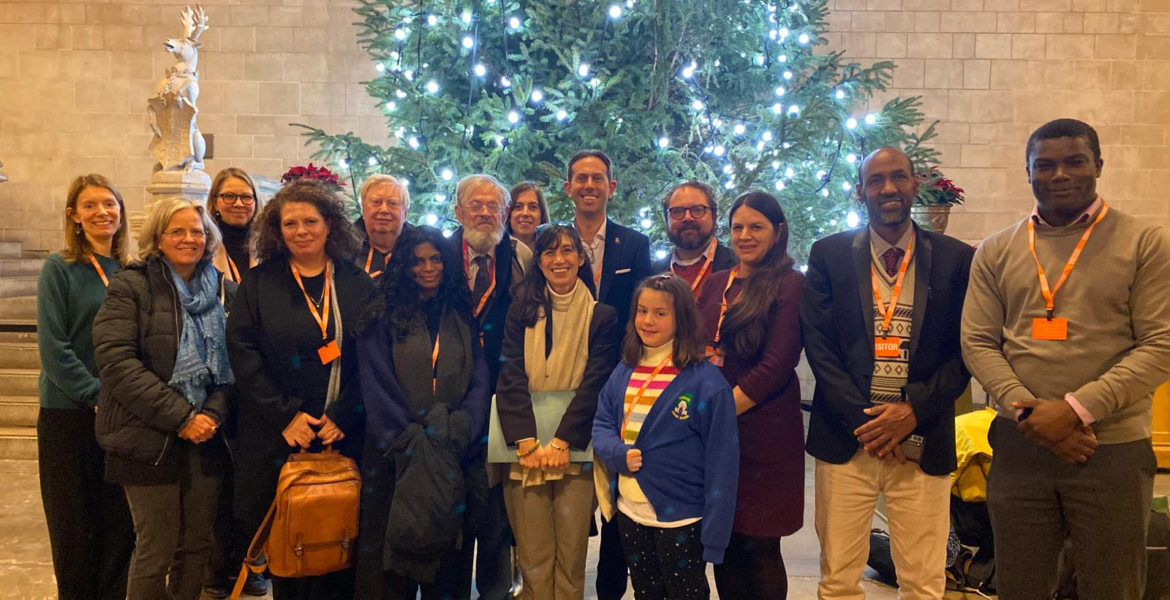Some EU citizens in the UK are being locked out of exercising their rights, a conference was told.
The Civil Society EUSS Alliance, which comprises over 200 organisations working with communities across the UK, raised their concerns at a meeting in the UK Parliament.
The event heard that many applicants face hurdles in trying to secure their right to remain in the UK.
Hundreds of thousands of vulnerable EU citizens are at risk of being left undocumented, which could see them excluded from employment or unable to access health and social care, it is claimed.
No one from the UK Home Office was immediately available to comment on the allegations.
The meeting was organised by the campaign group New Europeans UK on 11 December. It was hosted by Manuela Perteghella, the MP for Stratford-on-Avon, and held in one of the rooms off Westminster Hall, where the late Queen Elizabeth II lay in state.
The Liberal Democrat MP, who won her seat at the General Election this summer, is herself an EU citizen, originally from Italy.
Others present included Baroness Lister (Labour), Lord Balfe (Conservative), Lord Rennard (Lib Dem) and Lord Hannay (Cross-Bench) and Lydia Martin, Deputy Head of Projects at New Europeans UK.
Martin, who also co-ordinates the Civil Society EUSS Alliance, told of the main challenges faced by vulnerable EU citizens in using the EU Settlement Scheme (EUSS) to secure their immigration status and rights.
The cases, which New Europeans UK and other groups in the Alliance, now see of EU citizens still trying to secure their status tend to be complex in nature.
She said, “We are at a stage now, where everyone making an application, or who has issues with their status and exercising their rights, really should be getting legal advice. This means that if you don’t have access to or can’t find a free accredited adviser near you, then we are in a situation where people are locked out of exercising their rights,” Martin explained.
In practice this could mean people being excluded from employment or education, or unable to rent accommodation. It could also see them denied access to welfare and benefits, along with health and social services, she said.
At the same time, it could leave people unable to travel abroad while their application is on hold, and see family members separated or living with different statuses, she added.
Organisations supporting EU citizens with their applications are already seeing examples of people losing their job or landlords rejecting EU citizens, or people being stopped at the UK border, the event heard.
The UK government created the EUSS scheme, requiring every EU citizen who moved to the UK before December 2020, to apply for residency in order to secure their rights, as set out in the Withdrawal Agreement reached between the UK and the EU.
But whilst millions of applications for EUSS have been granted by the Home Office, more than a million applications have been rejected.
This means that organisations offering support to EU citizens with their applications are now mainly dealing with late or rejected applications. These are often from EU citizens, who either were not aware of having to apply or who are facing barriers, such as language difficulties or a lack of digital and literacy skills needed to fill in the application.
Many of them tend to be older people, women, and belong to ethnic minorities, the conference head.
Some lack the required documentation needed to complete the application.
More than six million people in the UK are required to secure their immigration status and rights through the scheme.
Thus far, some eight million applications were made by EU citizens in the UK under the scheme.
Around 4 million (50%) of them were granted Settled Status (after proving at least five years of residence) while 2.8 million (35%) were granted pre-settled status.
Another 15 percent had other outcomes, including refused applications or withdrawn or invalid applications.
Those with pre-settled status will need to upgrade to settled status once they reach the required five years of residence. This means millions will still need to secure their immigration status in years to come.
Separately, New Europeans UK , together with Unlock Democracy, is stepping up its ongoing campaign for overseas parliamentary constituency.
Although all UK citizens living abroad are all able to vote due to the removal of the 15 year bar, the group says their voices are substantively muted by a weak system of representation in Westminster.
They are represented by the MP from their last place of residence in the UK (which they might have left over 30 or 40 years ago). Their MP, it is claimed by the groups, are likely to have had little experience of dealing with the issues citizens abroad regularly face.
“This means their issues are often not addressed, or only poorly addressed by their MP,” says Else Kvist, Head of Campaigns and Communications for New Europeans UK.
Currently, 17 countries, including several European countries – Croatia, France, Italy, Lithuania, North Macedonia, Portugal, and Romania have established overseas constituencies.
The two groups say the UK could implement such a system through a two-stage process: first, running a registration drive for eligible citizens, and second, determining the number of MPs, based on the registered number of overseas voters, and set by the Boundary Commission using the typical UK constituency electorate.
New Europeans is supported by, among others, the UK Home Office, Trust for London and the Community Fund. It is a former winner of the Sheila McKechnie Foundation award.




